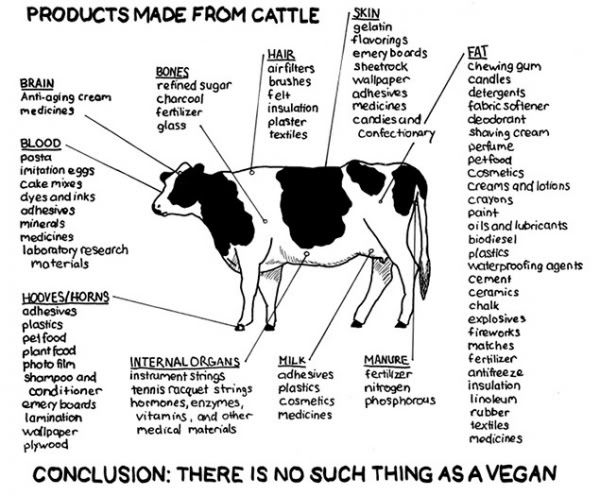Ethical implications of food?

nevadjinn
Posts: 75 Member
I'm already a vegan, so I know enough about animal agriculture. What I'm wondering is what are the ethical implications of vegan foods? Does the production of my food entail some injustice I'm not aware of? What is the impact of the production of food packaging etc on people and the environment?
If you think attempting to eat compassionately is BS or that modern agriculture is ethical, don't bother responding. Enough people voice that opinion in my non-virtual life and I'm not here to hear it reiterated.
Thanks!
If you think attempting to eat compassionately is BS or that modern agriculture is ethical, don't bother responding. Enough people voice that opinion in my non-virtual life and I'm not here to hear it reiterated.
Thanks!
0
Replies
-
I'm already a vegan, so I know enough about animal agriculture. What I'm wondering is what are the ethical implications of vegan foods? Does the production of my food entail some injustice I'm not aware of? What is the impact of the production of food packaging etc on people and the environment?
If you think attempting to eat compassionately is BS or that modern agriculture is ethical, don't bother responding. Enough people voice that opinion in my non-virtual life and I'm not here to hear it reiterated.
Thanks!
You are asking a question of ethics, but don't want to hear all sides, this sounds more like you are looking for people to agree with you to me.
Eat how you like, as long as you eat. I do not judge.0 -
If your looking for evil you can find it anywhere. How about this. If your not growing your own food the fossil fuels that delivery trucks/supermarkets burn evey day is huge...therefor everyone should grow their own food. Similar argument about recycling, and hybrid cars - the system/production itself does more harm them good.
Ethics is rubbish. Do what you want. There will always be something unethical about your decisns because there is no such thing as a perfect world.0 -
Hi there, I'm pretty sure there is a 'shop ethical' app for your iphone (if you have one). I haven't used it, but heard about it on the radio the other day, would be interesting to know what vegan brands are listed. I also like to think through what I'm eating... was aghast at the 'Food Inc.' documentary. :-) Hope you find some useful tips here.0
-
You are asking a question of ethics, but don't want to hear all sides, this sounds more like you are looking for people to agree with you to me.
^^^thisEthics is rubbish. Do what you want. There will always be something unethical about your decisns because there is no such thing as a perfect world.
^^^and this0 -
the monocrops used to raise so many of our products are damaging
 the harvesters that they line up side by side in a huge
the harvesters that they line up side by side in a huge
row and send over the 1000's of acres of monocrop to harvest kill lots of little critters living in those fields... just because they're small and out of sight they are not valued as the cows or other livestock raised for meat?
I dunno, nature itself is pretty "rotten" my chickens will make short work of a mouse if they can catch one, they also put a beating on the grasshopper population that would otherwise ruin my garden... then the hawks / fox that come in and take my chickens... all you find is feathers and one less to count when locking them up.
Not to mention the miles logged on my food to get strawberries from California to me in the winter... or the berries from Chile.....It adds up. For each and every one of us eating the food. But our food system, there's something to look at. If weather hits and shuts down transportation... look at hurricanes.. look at blizzards ... look at floods.. disruption to transportation and because of Just in Time delivery most stores run out of products as they only have a couple days worth of normal sales volume on hand...0 -
Quite frankly unless you grow your own food and eat nothing other than what your own two hands provide, you can't get away from all ethical implications. I try to eat as closely to vegetarian as possible, but that is merely for health. I am 100% supportive of all my Vegan friends, and understand the decision. The problem is that the only way to completely free yourself from guilt is to buy an acreage and live off the land...but you will have to do it old-style...with no tractors or fuel because that opens another door of ethics.0
-
There's a lot of human rights violiations going on out there - cocoa production in Africa is one that springs to mind.
And when I see the incredibly cheap price of a lot of kitchen utensils, storage containers etc, I'm concious that there is bound to be a factory full of incredibly poorly paid workers producing that 99c storage box.
It's really tough, and to be honest I've mostly decided that I can't take on all those issues. I try to "reduce, reuse, recycle" as a guiding principle, and minimise the airmiles in my food stuff... but beyond that I just don't look too hard because it's too depressing.0 -
I agree with how (some of) the above posters have responded (in some respects). It would be nigh on impossible to lead an ethically perfect life in relation to food sources, without being totally self sufficient/living from the land. However, I do believe that educating yourself as best as possible about the origins of your food choices (which you are evidently doing) and honestly making the best possible choices according to that knowledge and also according to your means, is living compassionately.0
-
Thanks Kymmy. Honestly, ethics is not BS. You aren't an ax-murderer, right? I'm sure you're nice sometimes when you don't have to be. So you believe in ethics to some degree. Perfection is impossible, but trying to minimize contributions to totally terrible industries is not foolish. Also, some negative impacts (fossil fuels etc.) are outweighed by positive impacts, like supporting an organic farm. Yes, I will always contribute to evil, but that will not stop me from trying to live as a good person :P0
-
Also, I am not attempting to form the opinions I want by censoring opposition. But I am not here to critique the arguments that have been hurled at me a hundred times before. Kapiche?0
-
I agree that while it may be impossible to eliminate your negative impacts, it should certainly be a goal to minimize those impacts. It's a shame that some people find that to be a pointless exercise or choose to ignore the problems they help create. Other than the elimination of animal products, best things I can think of are fairly obvious: don't buy fresh produce out of season (saves miles and money), try to buy local, try to buy in bulk (saves packaging and money), buy organic when feasible. Don't buy any bottled water. One thing to consider is that much fresh produce, even organic, is hand picked by migrant workers (in the US, anyway), who likely have no rights. Growing your own is a nice ideal, but impractical for many people. You could look into CSAs, but I'm not sure that is much better. This is something I have to research further myself; I should also look into some of those ethical shopping apps.0
-
I read this as "Ethical implications of flood?" and was thinking, "What the heck?" :huh:0
-
Looking at it from the simple ethic of harm to living creatures, I suspect that agriculture harms FAR more life than the meat industry. The simple harvesting of a crop alone likely results in the deaths of thousands, if not hundreds of thousands, of living organisms. But most people seem to have a strange divide in their ethics... if it's fluffy or furry and dying at human hands it's terrible, but if it's bugs, ants, spiders, snakes, or field critters getting mashed up in harvester blades then it's perfectly acceptable.
Being a human being eating food that others produce necessarily causes death and suffering, be it meat or vegetarian. That's just something we have to live with.0 -
My worries food wise are food miles and packaging. I try to buy fruit and vegetables locally from the farmer's market, and not packaged, and get organic boxes delivered. It does limit me to what is in season, but I don't think that's a bad thing. Why should we be able to eat strawberries and cherries all year round? Surely part of their appeal is their scarcity?0
-
I once did a ecological footprint quiz between how I used to live when living in India and how I live now in US. My Indian foot print was 1 whereas US footprint was 4. That is just the sad reality.
What is the difference between my life in India vs. here?
Eating local is the way of life in India. The produce is harvested and sold the same day. Whatever is left over at the end of the day goes for super cheap for the poor! Next day, new produce
Cooking from scratch every single day and every single meal!
No canned or frozen products so no need to spend the energy need to do those tasks
Seasonal fruits and vegetables only unless you want to pay big bucks. Ironic how it is more expensive to eat seasonal & organic fruits & veggies here.
Taking mass transportation instead of each person driving separately
Living in way smaller houses, families living jointly, siblings sharing rooms, etc.
Eating vegetarian (though I'm still a vegetarian)
Walking to markets and all nearby places. Less obesity rates, less overall strain on the system
These are just a small example of the difference in ways of living and it makes a huge difference in the overall impact on the earth.
I am trying hard to live the same way here. I cloth diaper my daughter, am trying to eliminate plastic, eat local and shop farmers markets when they're in season! Living in VA we only have them in the summer.
I'm not saying that living in India is the best thing on earth, however, as far as ecosystem is concerned it is lighter on the environment when compared to the western countries. Now other areas could use some help!0 -
One of the biggest myths assoicated with vegan culture.......it's a religion to most vegans, and in that respect the opportunity for discussion is downhill at best.I'm already a vegan, so I know enough about animal agriculture.0 -
One of the biggest myths assoicated with vegan culture.......it's a religion to most vegans, and in that respect the opportunity for discussion is downhill at best.I'm already a vegan, so I know enough about animal agriculture.
I'm confused by this - is the "myth" that the OP knows about animal agriculture? Or that veganism is "a religion"?0 -
You've all raised some good points. I think the "ethical implications" go further than our impact on the environment, and their impact on us should be considered, too. Many people are so far disconnected from their food (or their idea of what 'food' is) that unhealthy eating habits are now rampant in the U.S. What about the connection to your food? Sure, as several people have said, it's difficult to be totally connected and in control of your food unless you grow/raise it yourself. That's difficult for a lot of people (especially those living in large urban areas); but what about preparing your own food? Be thankful for the food that you are able to acquire! Be mindful of what it's qualities (nutritionally speaking) are and how it will serve your body. I applaud anyone who takes the time to consider where their foods come from, what environmental and ethical impact it has on the world and their community.
I live on a game ranch in Texas and have a garden; we eat fresh Axis venison (which eats only grass, as opposed to browsing on roots, etc like whitetail deer do) and free-range eggs/chicken. Occasionally, we must harvest one of the exotic wildlife species that we take care of on the ranch. Want to talk about ethical implications? I wish I had a dollar for everytime someone gave me or my husband a hard time about "hunting" and how in-humane or cruel it is. Meanwhile, we watch each baby animal grow, ensure it's protected from predators, disease, drought and the elements; and then watch it grow up to produce offspring of its own. It's not pleasant to kill/eat something you have raised...but I feel that it's being a good steward of the land and the animals. And there's something to be said for the energy-force of our foods. Dr. Gabriel Cousens has written extensively on this in "Spiritual Nutrition" - which is a fascinating read!0 -
I worry about the ethics of food production and consumption, too. I can't make myself buy eggs at the grocery store except for the ones with this lable: http://www.certifiedhumane.org/index.php Mostly I buy locally raised eggs. There are only a few brands of milk I'll buy, and I used to only buy a few brands of cheese (cheese got to be so expensive I just cut way back on it and buy the cheapest stuff I can find). Our finances have suffered over the past few years so I've had to make some painful decisions about priorities. But eggs, milk and butter have been things I just can't budge on... I'll either buy them from sources that respect animals or I won't buy them.
There is a little store near my house that sells lots of locally raised food and I buy what I can from them, and then fill in elsewhere... mostly Trader Joe's. Just a few weeks ago I found out that Trader Joe's has had some attention recently because of what they pay some of the folks who pick produce for them... not good attention, either.
Transportation of food is a huge issue with regard to ethics. Monocropping is, too. And packaging.
I started making my own laundry detergent a few years ago because of transportation ethics and frustration over excessive, non-recyclable packaging, and I couldn't be happier with the results. For a while I made bread and yogurt because I was trying hard to reduce the amount of plastic we use. Those are things that I can do for a while and then I get my routine interrupted and I don't do it for a while. I'm hoping to get back to those again soon.
Sorry this is rambling so badly... I'm thinking and trying to type and trying to listen to my children all at the same time. I think it is time to move away from the computer for a bit!!
I look forward to reading other thoughts on this! Thank you for bringing it up! We can all make a difference if we decide to and it is absolutely worth it!
Shannon0 -
And there's something to be said for the energy-force of our foods. Dr. Gabriel Cousens has written extensively on this in "Spiritual Nutrition" - which is a fascinating read!
Oh! I just had to comment on this! I have never heard anyone else mention this concept! How cool. I have believed that this is an important consideration to our health for a very long time but I've never met anyone else who had ever even thought of it. I'm assuming you mean that animals and plants that have healthy, supportive environments that will allow them to reach their full potential harbor a positive energy that has a positive affect on us when we consume it... is that right? I don't voice this opinion often because I expect folks to think I'm crazy, but it absolutely guides my thinking with regard to nutrition and ethics. I'll have to find that book!
Shannon0 -
-pesticides kill insects
-insects and small rodents are killed during mechanized farming
-you have to kill a plant to eat it0 -
Reading Peter Singer definitely stimulated some interesting thought for me. You may have already read his books but if not, I recommend. And of course there's Michael Pollan for a different perspective.0
-
I'm already a vegan, so I know enough about animal agriculture. What I'm wondering is what are the ethical implications of vegan foods? Does the production of my food entail some injustice I'm not aware of? What is the impact of the production of food packaging etc on people and the environment?
If you think attempting to eat compassionately is BS or that modern agriculture is ethical, don't bother responding. Enough people voice that opinion in my non-virtual life and I'm not here to hear it reiterated.
Thanks!
You are asking a question of ethics, but don't want to hear all sides, this sounds more like you are looking for people to agree with you to me.
Eat how you like, as long as you eat. I do not judge.
Exactly!0 -
I'm all for ethical food production, be it vegetables, grains or meat.
Vast quantities of pesticides (herbicides & insecticides) are used to produce grains and vegetables which have a negative impact on our environmeny, just look at soy and corn production as examples.
Organic food production methods reduce the amount of pesticides used but even then they are not eliminated.
The only way to live ethically is to produce and grown your own food.0 -
Reading Peter Singer definitely stimulated some interesting thought for me. You may have already read his books but if not, I recommend. And of course there's Michael Pollan for a different perspective.
I definitely second the Singer suggestion.0 -
awww man!
I have an awesome picture for this thread and I can't work out how to post it short of starting a flckr or photobucket account. If someone else wants to do it for me, it's here:
http://hunter-gatherer.com/blog/there-no-such-thing-vegan0 -
 0
0 -
The ethics of veganism are a fantasy. You're not killing less animals by being vegan as the ignorned animals, the smaller nearly invisible kind (mice, rats, rabbits, etc.) are killed by taking away fields and plowing them under after each harvest.
Estimates show that if all 120,000,000 acres of cropland in the continental United States were used for a vegan diet then approximately 500 million animals would die each year. But if half of the cropland were converted to ruminant pastureland, by contrast, then it is estimated that only 900,000 animals would die each year.
But it's ok, nobody saw those animals anyway right? I mean a mouse is certainly not the same thing as a cow, killing bigger animals certainly has to be worse than killing smaller ones.0 -
-you have to kill a plant to eat it
Not even close. Just about all fruit and vegetables are eaten without killing the plant. Yes, roots like carrot/potato will kill the plant, but leaves can be eaten (lettuce) without killing the plant if you have your own garden.0 -
Shannon/peacemongernc:
The idea of 'bio-availability' also encompasses what we all know: that everything is made of energy; and that energy is neither created nor destroyed. Whole, raw foods impart more energy to our bodies than do cooked, processed foods.
Check out Kirlian photography of plants (there are tons of sites, but here's one w/some cool pictures: http://www.energymedc.com/kirlian photography.htm). If you watch the video there, take note of the "phantom effect" they discuss (just before the 9-minute mark) when leaves are photographed after having a portion of the leaf removed.
Populations that grow/raise their food are obviously healthier than those eating the 'Standard American Diet'. I believe that part of this is due to the connection they share with their food sources. (Energy spent tending/nurturing plants and livestock is "invested" in that organism and is "withdrawn" when eaten later.) Of course, they are typically very active populations (as farming and raising animals is no easy task!); which coupled with their lack of processed foods (harmful packaging, hormones, etc that we are all trying to avoid) also keeps them in better health.0
This discussion has been closed.
Categories
- All Categories
- 1.4M Health, Wellness and Goals
- 398.1K Introduce Yourself
- 44.7K Getting Started
- 261K Health and Weight Loss
- 176.4K Food and Nutrition
- 47.7K Recipes
- 233K Fitness and Exercise
- 462 Sleep, Mindfulness and Overall Wellness
- 6.5K Goal: Maintaining Weight
- 8.7K Goal: Gaining Weight and Body Building
- 153.5K Motivation and Support
- 8.4K Challenges
- 1.4K Debate Club
- 96.5K Chit-Chat
- 2.6K Fun and Games
- 4.8K MyFitnessPal Information
- 12 News and Announcements
- 21 MyFitnessPal Academy
- 1.5K Feature Suggestions and Ideas
- 3.2K MyFitnessPal Tech Support Questions


















